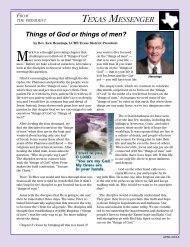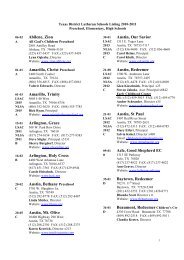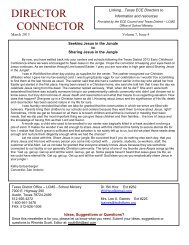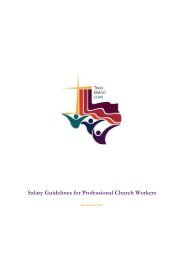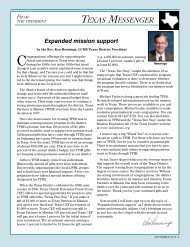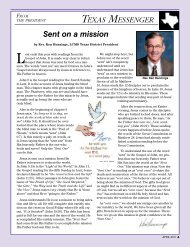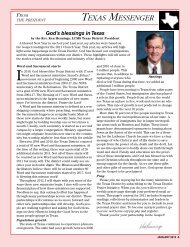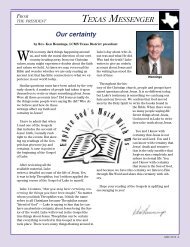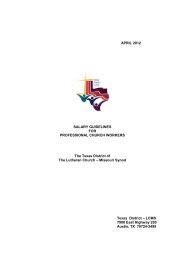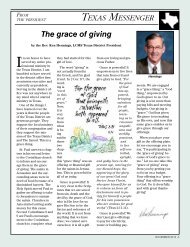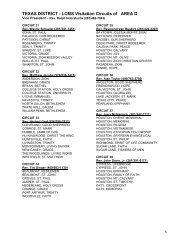May 2012 - The Texas District of the Lutheran Church-Missouri Synod
May 2012 - The Texas District of the Lutheran Church-Missouri Synod
May 2012 - The Texas District of the Lutheran Church-Missouri Synod
You also want an ePaper? Increase the reach of your titles
YUMPU automatically turns print PDFs into web optimized ePapers that Google loves.
sTaying<br />
connecTed<br />
D TEXAS DISTRICT<br />
Are you helpless?<br />
by <strong>the</strong> Rev. Dr. John Hirsch<br />
Director <strong>of</strong> Congregational and Worker Care<br />
We cannot direct <strong>the</strong> wind but we can adjust<br />
<strong>the</strong> sails. Author unknown<br />
PERHAPS embellishing on <strong>the</strong> above<br />
quote, Jimmy Dean is reported to have said, “I can’t<br />
change <strong>the</strong> direction <strong>of</strong> <strong>the</strong> wind, but I can always<br />
adjust my sails to reach my destination.” Each <strong>of</strong><br />
<strong>the</strong> above statements reflects an optimistic attitude<br />
about life. Things happen in life and many <strong>of</strong> <strong>the</strong>m are<br />
negative, unwanted, seemingly unjust or unfair. We<br />
can feel discriminated against and picked on. We can<br />
feel bullied and experience immoral or even evil behavior<br />
from o<strong>the</strong>rs. We may be in an abusive relationship<br />
with a girlfriend or boyfriend or in a marriage.<br />
AS A RESULT, we can feel helpless and hopeless.<br />
We can feel o<strong>the</strong>rs are destroying our life and we have<br />
no place to turn. We can lose our appetites or overeat.<br />
We feel shame and worthlessness. We can become<br />
asocial or antisocial. Life is tolerated but not lived.<br />
IN HIS BOOK, Enjoy Life, Lynn Johnson referenced<br />
Marty Seligman and some research work that<br />
led to <strong>the</strong> <strong>the</strong>ory <strong>of</strong> “learned helplessness.” Basically,<br />
it notes that all people experience, stress, pain, disappointments<br />
and losses. All do not have <strong>the</strong> same<br />
experiences and some have more stressful or traumatic<br />
experiences than o<strong>the</strong>rs. Some even seem to<br />
have more than <strong>the</strong>ir “fair share,” e.g., <strong>the</strong> couple who<br />
owned a house near Austin that was flooded when<br />
<strong>Texas</strong> experienced much rain a few years ago. <strong>The</strong>y<br />
chose to avoid this possibility again by moving to Bastrop,<br />
only to have that house burn down in <strong>the</strong> Labor<br />
Day weekend fires <strong>of</strong> 2011 two years later.<br />
THE QUESTION is not, do we have pain in life<br />
but how do we react or respond to it? Do we have<br />
to suffer and, if so, how much must we suffer? <strong>The</strong><br />
answer is, depends. Depends on our own resiliency.<br />
In general, optimists think bad things are temporary<br />
and good things are permanent and pessimists believe<br />
<strong>the</strong> opposite. In o<strong>the</strong>r words, those who seemed to<br />
be <strong>the</strong> most resilient were those who also manifest a<br />
more optimistic attitude on life. It wasn’t <strong>the</strong> good or<br />
bad things that happened, but how <strong>the</strong>y thought about<br />
<strong>the</strong>m. It was how <strong>the</strong>y explained events.<br />
I HAVE always been interested in<br />
<strong>the</strong> discoveries <strong>of</strong> <strong>the</strong> behavioral<br />
Hirsch<br />
sciences and <strong>the</strong> benefits <strong>the</strong>y can<br />
provide us in living healthier, more productive lives.<br />
But it also fascinates me that <strong>the</strong>se “discoveries”<br />
are only uncovering that which God built into us in<br />
creation. In this case, we read in Rom. 12:2 (NIV),<br />
“be transformed by <strong>the</strong> renewing <strong>of</strong> your minds,”<br />
and <strong>the</strong>n Paul lays out an evermore graphic picture,<br />
“Surely you heard <strong>of</strong> him and were taught in him in<br />
accordance with <strong>the</strong> truth that is in Jesus. You were<br />
taught, with regard to your former way <strong>of</strong> life, to<br />
put <strong>of</strong>f your old self, which is being corrupted by its<br />
deceitful desires; to be made new in <strong>the</strong> attitude <strong>of</strong><br />
your minds; and to put on <strong>the</strong> new self, created to be<br />
like God in true righteousness and holiness” (Eph.<br />
4:21-24 NIV).<br />
PART OF GOD’S PLAN <strong>of</strong> our living out our salvation<br />
is recognizing <strong>the</strong> fact that He created us with a<br />
brain with frontal lobes, <strong>the</strong> place where executive<br />
function takes place. With those lobes, we can think<br />
and with that thinking we can integrate into our lives<br />
His words—words <strong>of</strong> hope, love, forgiveness, purpose,<br />
passion and value. To Nicodemus, Jesus said,<br />
“do you not understand <strong>the</strong>se things … God did not<br />
send his Son into <strong>the</strong> world to condemn <strong>the</strong> world,<br />
but to save <strong>the</strong> world through him” (John 3:10-17<br />
NIV).<br />
YOUR HAPPINESS is not based on fate or what<br />
comes your way. It is not <strong>the</strong> result <strong>of</strong> your being unluckier<br />
than o<strong>the</strong>rs. Your happiness depends on what<br />
you tell yourself about what happens. It is what you<br />
do with what you hear, experience or think. This article<br />
is way too short to address all <strong>the</strong> issues that can<br />
make us unhappy; but if <strong>the</strong>re are past negative or destructive<br />
events in your life that bind you to <strong>the</strong> past,<br />
choose to not let this continue. Pray about it and ask<br />
God to remove this burden from you. Don’t be passive<br />
and just accept it and be unhappy. Act on it. Seek help<br />
from a trusted friend, pastor or counselor. Use wisely<br />
<strong>the</strong> brain God gave you. You may not be able to direct<br />
<strong>the</strong> wind, but God has given you resources to adjust<br />
<strong>the</strong> sails.




